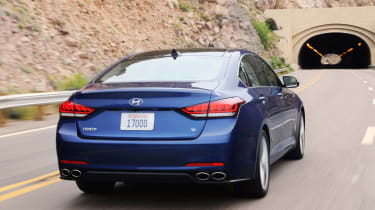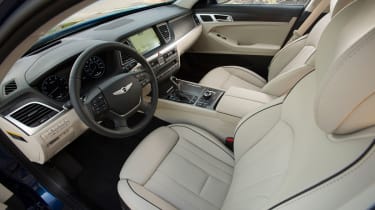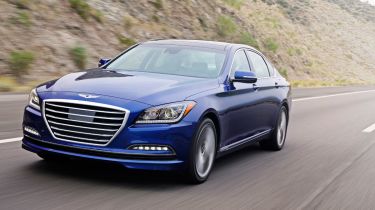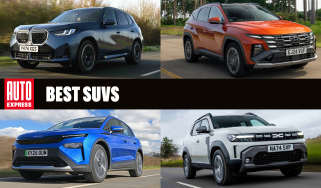Hyundai Genesis 2015 review
Hyundai enters the executive saloon market in earnest with the new 2015 Genesis

Hyundai continues to display its potential with the new Genesis. In the US, the car used to be seen as a choice for buyers more interested in value and style than quality and ability – but now, it’s up there with more established European rivals. Hyundai only expects to sell about 20 a year in the UK, and unless it adds a diesel, this car is difficult to recommend.
The original Hyundai Genesis was never sold in the UK, but this all-new car will arrive here by the summer, taking the brand into territory occupied by the Mercedes E-Class, Audi A6 and BMW 5 Series. That’s some serious competition.
The Genesis is aiming to stand out through bold styling, and you can’t argue with the head-turning looks. It fully embraces the brand’s Fluidic Design 2.0 design language, blending a hexagonal front grille with swept-back lines and a low and wide rear.
US buyers can choose from 311bhp 3.8-litre direct-injection V6 or 420bhp 5.0-litre GDI V8 petrol engines, and Hyundai predicts that 85 per cent will go for the V6. On this side of the Atlantic, the lower-powered version will be the only option – it claims economy of just over 30mpg.

Whereas US customers will have the option of four-wheel-drive, on UK cars power is only delivered to the rear wheels. The 4WD set-up is optimised for a 40:60 front-to-rear bias, and can send 100 per cent of the power to a single wheel if it needs to.
Used - available now

2014 Audi
RS6 Avant
74,500 milesAutomaticPetrol4.0L
Cash £29,750
2023 Jaguar
I-PACE
21,689 milesAutomaticElectric
Cash £22,657
2020 Jaguar
I-PACE
71,152 milesAutomaticElectric
Cash £15,903
2020 Jaguar
I-PACE
22,012 milesAutomaticElectric
Cash £20,536We tried both engines, but the good news for UK customers is that the V6 is more engaging. It serves up silky acceleration, with the automatic box shifting smoothly as the Genesis sprints from 0-60mph in just under six seconds.
Hyundai engineers, with help from Lotus, worked hard to get the handling right, and we were impressed. Not only did the Genesis provide good steering feedback, it also displayed a confident firmness over potholes that would rattle occupants’ teeth in lesser cars. Plus, acoustically tuned sound chambers introduced a hint of engine roar into the well insulated and serene cabin.
While the new Genesis is only 5mm longer than the model it replaces, the wheelbase has been stretched by 24mm, which makes for a supremely spacious interior, with masses of leg and headroom for rear passengers.
But the increase in size isn’t the only improvement; the finish has undergone a transformation, too, and is now at the level required of a premium saloon.

New, double-stitched leathers set the tone, and are joined by a range of matt-finished wood veneers to give a top-quality ambience that wouldn’t look out of place in a Mercedes. The front seats provide 12-way power adjustment and offer heating and ventilation functions.
Sat-nav is standard as well, and a 9.2-inch high-definition central display is available to make it even easier to use. Plus, Apple’s Siri Eyes Free is another new addition for 2015.
A full suite of safety systems is available to protect the Genesis and its occupants. Colour head-up display minimises driver distractions and a new leather-wrapped steering wheel with built-in vibrations alerts you to cars in your blind spot, as well as lane drift.
Lane Keep Assist keeps the Genesis in its lane by applying a bit of steering angle, while drivers can also use the Smart Cruise Control at speeds below 50mph, in congested motorway traffic, for example.
This set-up brings the car to a complete halt when the vehicle in front stops, but if the car ahead moves within three seconds, the new saloon will start to move automatically, too.
UK sales will be hampered by the fact there’s no diesel Genesis, and residual values won’t be good. But even so, Hyundai has come up with a car that doesn’t look or feel out of place in this class – and that’s an impressive feat.







